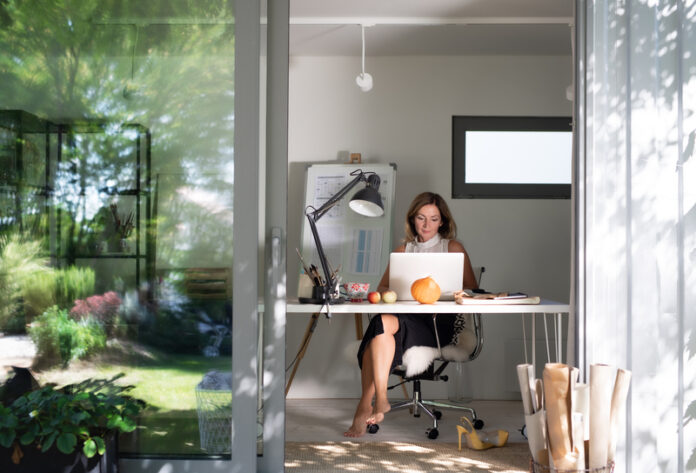
How a Garden Office Affects Property Value
A garden office can increase a property’s market value by 5% to 15%, depending on its quality, location, and relevance to changing lifestyle needs. This trend has become especially visible in the UK housing market, where remote working has reshaped buyer priorities.
Surveyors evaluate garden buildings by looking at four core aspects: the build quality, how permanent the structure is, whether it’s connected to utilities, and whether it complies with planning rules. Permanent structures with heating, electrics, and proper foundations are typically assigned more value during a property valuation.
Buyers increasingly seek additional space outside the main home. This makes garden offices attractive, particularly in high-demand areas like London, Bristol, and commuter towns. Many homeowners now look to build a home office in the garden as a way of meeting modern lifestyle needs and boosting long-term property value.
Key Factors That Influence Added Value
Build Quality and Features
The quality of construction has a direct impact on how much value a garden office contributes. Buyers prefer buildings that are insulated, energy efficient, and usable throughout the year. Features such as SIP panels, double-glazed windows, and efficient heating or cooling systems create a more appealing environment and support long-term use.
A garden office built with modern and stylish materials is seen as a functional extension of the home. Timber cladding, composite panels, and green roofs add visual appeal, while also improving insulation and lifespan. Offices with smart lighting, underfloor heating, and high-speed connectivity gain additional attention.
Energy performance plays a critical role too. Cost-effective structures that reduce running costs often receive higher valuations and attract buyers who prioritise sustainability.
Size, Design, and Versatility
The size and layout of the garden office affect its usability and market appeal. Offices between 12 and 20 square metres are considered ideal, offering enough room for a desk, seating, and storage without overwhelming the garden.
Design versatility adds further value. A space that can function as an office, art studio, fitness room, or guest area appeals to a wider range of buyers. Garden offices that offer privacy, sound insulation, and a clear separation from the main home are seen as premium features.
Buyers often describe these detached rooms as quiet and functional, which increases both perceived and actual property value. Surveyors take these factors into account when estimating the impact on valuation, especially in densely populated areas where space is at a premium.
Planning Permission and Building Regulations
Most garden offices in the UK do not require planning permission as long as they meet conditions under Permitted Development Rights. These conditions include staying under 2.5 metres in height if located within two metres of a boundary and being used only for incidental purposes, not as permanent accommodation.
Planning permission becomes necessary when the office exceeds size limits, includes plumbing, or is used commercially. Compliance with UK building regulations is crucial. Estate agents advise that buildings without approval may raise red flags for mortgage lenders and buyers. Architects also note that certified compliance improves long-term property value.
Surveyors assess whether a structure meets legal requirements and whether it was constructed professionally. A fully compliant garden office is viewed as a legitimate and valuable addition to the home.
Garden Office vs. Other Home Improvements
Garden Office vs. Traditional Extension
A garden office is typically faster to build, more affordable, and causes less disruption than a traditional house extension. While a single-storey extension often costs between £30,000 and £80,000, a high-quality garden office usually falls between £10,000 and £25,000.
The average build time for a garden office is two to four weeks. In contrast, extensions may take several months and involve structural changes, planning approval, and prolonged disruption.
Homeowners often prefer a garden office for its quick installation and limited impact on daily life.
Builders report that clients increasingly opt for outdoor offices to gain workspace without affecting the internal layout. Financial advisers support this approach as a more efficient way to add functionality with a manageable investment.
Garden Office vs. Room Conversion
Converting an existing room inside the home is another common alternative, but garden offices provide better privacy and flexibility. Internal conversions often involve sacrificing living space, which can reduce appeal to families or those needing multi-use rooms.
A detached garden office avoids this trade-off. It offers a quiet and private space separated from household activity. Buyers view it as a true bonus area rather than a rearrangement of existing rooms.
From a valuation perspective, surveyors often assign more value to well-constructed detached offices than to basic internal conversions. Features such as independent access, climate control, and integrated electrics contribute to this advantage.
Return on Investment and Market Demand
A well-designed garden office can add between 5% and 15% to a property’s overall value. The actual increase depends on factors such as design, usability, and local demand. Homes in areas with a strong remote-working population see higher returns.
Market trends show increased demand for home offices. Since 2020, Rightmove and Zoopla have recorded more searches that include terms like “home office” and “garden room”, especially in the suburbs and commuter zones.
Listings that mention work-from-home capabilities often receive more enquiries and faster offers. Dedicated workspaces have shifted from being a luxury to a necessity for many buyers, especially professionals.
This rising demand supports the idea that garden offices now compete with traditional extensions as one of the most desirable home improvements.
Financial and Legal Considerations
Tax Implications
Business use of a garden office may offer tax benefits, but only under specific conditions. If the office is used solely for work, some of the construction and running costs may be deductible. However, claiming full business use can lead to Capital Gains Tax liability on the office portion when the property is sold.
Financial advisers recommend a balanced approach. For sole traders or limited companies, partial deductions and VAT recovery may be possible if the office is bought through the business. Personal use reduces or eliminates these benefits.
Clear separation of personal and business use is essential for accurate tax treatment. Tax consultants advise maintaining detailed records and seeking guidance before making claims.
Investment and Value Uplift
Surveyors evaluate the investment based on factors such as location, comparable property sales, and the quality of the structure. Homes with permanent, fully serviced, and well-designed garden offices are valued higher than those with temporary or poorly constructed outbuildings.
The uplift in value must also consider the build cost. A garden office that costs £15,000 but adds £25,000 in market value offers a positive return. This varies across regions, but areas with limited internal space and high demand for remote work often produce better results.
Buyers increasingly ask about energy ratings, heating systems, and planning approval during viewings. These questions indicate how closely garden offices are tied to buyer decisions.
Insights from Buyers and Property Professionals
Buyers typically look for garden rooms that are well insulated, comfortable, and visually appealing. A space that works in winter and summer, with enough room for a desk, shelves, and reliable internet, is high on the list.
Estate agents confirm that a good garden office can increase viewing interest and raise asking prices. Properties that include properly finished garden buildings stand out in a competitive market.
Property surveyors estimate added value by reviewing condition, structural integrity, energy performance, and how well the office integrates with the rest of the home and workplace environment. A permanent, well-designed garden office helps attract the right buyer and may justify a higher mortgage valuation.
High-quality offices do more than just offer extra space. They enhance lifestyle, create clear zones for productivity, and upgrade the overall appeal of the property.
Find a Home-Based Business to Start-Up >>> Hundreds of Business Listings.















































